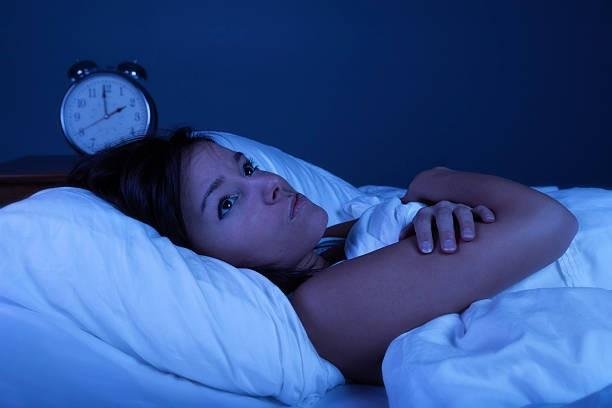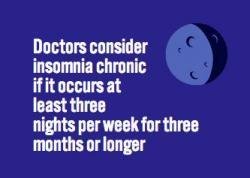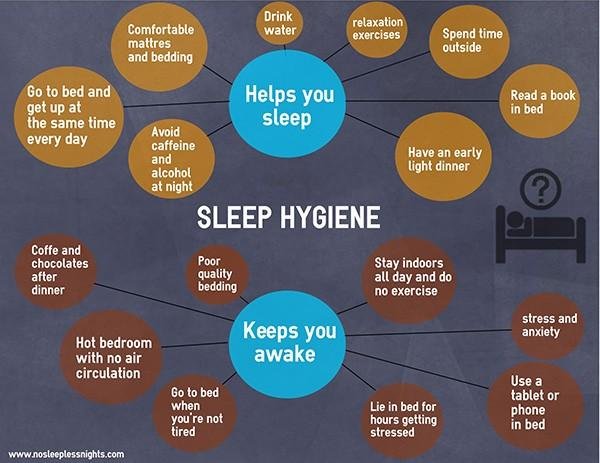INSOMNIA-Sleeping disorder

So, this morning, I woke up by 1 AM and had had only approximately 3 hours of sleep, and was finding it difficult to get back to sleep. I sought solutions to this problem and thought I should write about it.
Ever hit the bed and found out sleep was about a kabillion fifty miles away from you? And even though you're worn out and drained from the day's activities, you still felt unsleepy? Or you slept but woke up very early in the middle of the night or before you planned to wake up, and could not fall back into the loving embrace of sleep, so you ended up staring into the dark and praying for the night to end faster? This could be insomnia.
Insomnia is a sleeping disorder characterized with symptoms like the inability to fall asleep, or stay asleep if one eventually does sleep. It is difficult to fall back asleep after waking earlier than expected. Also, insomniacs wake up feeling tired and unrefreshed.
The body suffers sleep deprivation and this tells on the body in general. Insomniacs find it difficult to concentrate. They have general body weakness and have mood disturbances, that is, they tend to be more aggressive and irritable. They exhibit daytime sleepiness, and are often depressed and entertain suicidal thoughts. Since their body is deprived of sleep and its accompanying benefits, they tend to lead reduced quality of lives.
TYPES AND CAUSES:
There are mainly two types of insomnia:
Acute insomnia:
Acute insomnia is insomnia that proceeds for a short period of time, lasting from one night to several weeks. It may be due to:
• The lack of a suitable sleeping environment,
• Poor sleeping habits,
• Illness,
• Discomfort,
• Stress,
• Caffeine and nicotine,
• Certain medication, for example, high blood pressure medications.
Chronic Insomnia:
Occurs almost repeatedly for at least three nights in a week and over a period of 1 month. This is the more severe form of insomnia and may present with more consequences to life and bodily functions. It may be caused by:
• Depression,
• Pain or discomfort,
• Stress and,
• Anxiety.
In addition, insomnia could be:
Primary:when it has no direct relation to an existing health issue or habit and
Secondary: when it is caused as a result of an underlying ailment or psychiatric problem.

TREATMENT:
Insomnia often doesn't require treatment if proper sleeping habits can be imbibed by the patient. Should in case, the insomnia be chronic and influencing daily activities negatively:
•A professional physician should be consulted, and a physical examination be conducted. Examination of your sleep, medical or family history could follow.
• Administration of low doses of sleeping pills which should be used only under the prescription of a medical professional. However, in the long run, under continuous administration, these medications might actually be worsening the medical disorder by their various side effects.
• Address the cause of the insomnia: In cases of secondary insomnia, the underlying health issue or problem should be addressed. If environmental, correct the sleeping environment.

Practice healthy sleeping habits like these:
• Follow a sleep routine. Set a time to sleep and wake up and follow it every single day. The body is almost a puppet. Overtime, you'll get used to it.
• Avoid sleeping during the day or there might be no tiredness to sleep off during the night.
• Prepare yourself a suitable sleeping environment. If you sleep better, with the lights off, switch off the lights. If you'd rather sleep in a warm environment, then a warm environment it is.
• Avoid eating heavy meals before bedtime. An early, light meal is best.
• If you're ready for bed and find yourself still unable to sleep, get up and go about some other activities, and return when you feel you could sleep.
• Avoid taking stimulants like nicotine, caffeine late in the day.
It would interest you to know that:
• Insomnia is one of the commonest sleeping disorders affecting the adult population. In a 2005 NSF poll, over 50% of people reported to have at least one symptom of insomnia and 33% had at least one of the symptoms (almost) every night during 2004.
• More than 1.5million cases are recorded per year in Nigeria, yet this disorder is underdiagnosed and undertreated.
• According to the National Sleep Foundation, women are twice more likely to have insomnia than men, especially during pregnancy and menopausal stages when their hormones might be imbalanced.
• Alcohol abuse could result in insomniacs who drank to stupor to sleep. Drinking alcohol to sleep is in itself not advisable as the quality of sleep under its influence is very poor.
• Insomnia could be hereditary, as is the case in Fatal Familial Insomnia (FFI), a rare autosomal prion disease of the brain.
• The risk of having insomnia increases with age.
• In extremely rare cases, people can die of insomnia, especially when it is genetic.
Wishing everyone and myself a better sleep this night. Thanks for reading.
SOURCE
www.https.com//sleepfoundation.org/insomnia/
www.alaskasleep.com/blog/insomnia-facts-symptoms-causes-treatment-poor-quality-sleep
Photos sourced from gettyimages.com, sleepfoundation.org, healthrink.com
Thanks, i wish you a better sleep this night too, @preciouz.
I often suffered from insomnia on occasions. The exact cause is what i seem not to know yet. At some point i even needed to take alcoholic beverages to help deal with it.
Well, i'm currently doing better than a few months back.
Thanks for sharing.
Yeah. Thank you very much rickie. I'm glad you're doing better now.
I knew more and more people are suffering from insomnia in Nigeria, but I didn't know the rates and a whole lot of other things I learnt from your post. Thanks Precious and sleep like a baby tonight.
I'm glad you know now. Thank you very much Asa J.